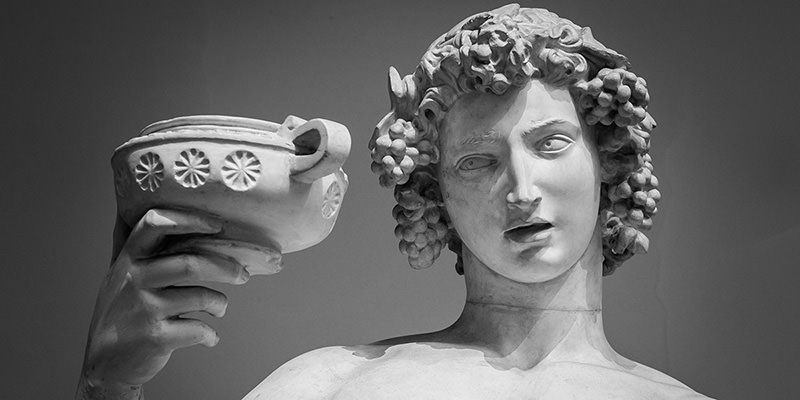
Secret drinking clubs are weird, mostly just by virtue of being secret drinking clubs. Think about it. There’s no way you’re walking into a secret drinking club without a special password, quite possibly in compliance with a bizarre dress code that includes a mask. Even if you’re not part of a secret drinking club, chances are you’ve found your way to a back alley speakeasy entrance and performed a special handshake or enunciated the right secret password to get inside. It’s weird, but we seem to love the implicit naughtiness of scurrying away somewhere out of sight and getting buzzed.
It turns out that whatever drives us to drink ceremoniously in secret isn’t really new. One of the oldest drinking clubs in human history is also one of the absolute weirdest. It was originally dominated by women and — maybe no surprise — came out of a religious cult. It was called the Bacchanal.
To be fair (also just technically accurate), Bacchanalia weren’t exclusively “drinking clubs.” In fact, they originated out of a form of intense, secretive religious gatherings among the Greeks and peoples of southern Italy going as far back as 600 B.C.E. Back in those days, Bacchanalia were essentially religious festivals held by small cults devoted to worship of the Greco-Roman god Bacchus (Dionysius in Greek). According to the New World Encyclopedia, when it originated, “the emphasis of the [Bacchanal] was preparation for an afterlife of punishments and/or bliss.” There was also a strong emphasis on fertility rites — hence the dominance of women. Of course, if you’re worshipping a god known to lord over everything from art and madness to wine, not to mention straddling the realms between life and death, it’s probably inevitable that things are gonna get a little weird. And weird they got.
By the time the Bacchanalia were introduced to Romans, around 200 B.C.E., the wine aspect of the festival had taken more of a central role and the Bacchanal quickly deteriorated from secret religious right to not-so-secret, days-long partying, with a ton of bad behavior fueled by booze. “Wine-drinking and feasting were added to the religious component,” says New World, “which led to ecstatic fanaticism and the practice of scandalous behavior.” (When you read “scandalous,” think: illegal, terrifying, and/or just straight up gross.)
And even after things got, well, sauced, the Bacchanalia tended to include more women than men.“Their husbands’ resistance notwithstanding, women took to the hills, wearing fawn skins and crowns of ivy and shouting the ritual cry, ‘Euoi!’” (Anyone’s guess on how to pronounce that.) Forming thyai (holy bands) and waving thyrsoi,” or fennel wands “bound with grapevine … they danced by torchlight to the rhythm of the aulos (double pipe) and the tympanon (handheld drum).” Sounds like a chill music fest, right? Not quite.“While they were under the god’s inspiration, the bacchantes were believed to possess occult powers and the ability to charm snakes and suckle animals, as well as preternatural strength that enabled them to tear living victims to pieces before indulging in a ritual feast (ōmophagia).” (Clearly, if someone invites you to a Bacchanal, you decline.)
Not that all Bacchanalia were the same, or necessarily involved tearing anyone limb from limb. There were different kinds of Bacchanalia with different kinds of celebrations at their core. The Leneae and the Great Dionysia (another word for Bacchanal) both emphasized dramatic performances over hooch. The Anthesteria, on the other hand, was all about drinking, celebrating the readiness of the prior season’s wine with three days of consumption. And we’re not talking moderate sipping here. There were drinking contests and apparently even kids got involved. (There was also a bit of a Halloween vibe to the whole thing, since people also believed “the souls of the day came up from the underworld and walked abroad” during the Anthesteria.)
But like any good party, the Bacchanalia eventually died out, thanks in part to a law passed in 186 B.C.E. that essentially forbade them. See, Bacchanalia were famously all-inclusive, with all participants leaving class ranks behind in favor of general mayhem. Roman politicians apparently didn’t like the whole democratic booze-fest-orgy thing. And they certainly didn’t like the fact that “women occupied leadership positions in the cult [of Bacchus] and thus undercut traditional Roman family values.” Not that you can entirely outlaw a good time; it took many years for secret Bacchanalia to really die down.
Fortunately, the practice of drink, madness, and heedless lovin’ remains part of the cultural fabric. We just tend to do our Bacchanal-ing indoors these days.
